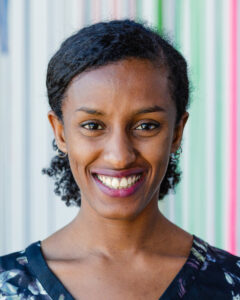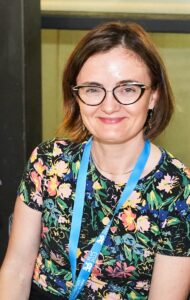 Rediet Abebe is a junior fellow at the Harvard Society of Fellows and an Andrew Carnegie Fellow. Her research examines the interaction of algorithms and inequality, with a focus on contributing to the scientific foundations of this area. Abebe has also co-founded numerous organizations, including the ACM Conference on Equity and Access in Algorithms, Mechanisms, and Optimization (EAAMO), and the associated international research initiative. Abebe is the recipient of numerous awards and honours, including the Hector Endowed Fellowship by the European Laboratory for Learning and Intelligent Systems (ELLIS), MIT Technology Fellows 35 Innovators under 35, the ACM SIGKDD Dissertation Award, and an honorable mention for the ACM SIGecom Dissertation Award. Abebe is currently leading several large-scale evaluations of ML systems used in commercial, legal, and policy contexts.
Rediet Abebe is a junior fellow at the Harvard Society of Fellows and an Andrew Carnegie Fellow. Her research examines the interaction of algorithms and inequality, with a focus on contributing to the scientific foundations of this area. Abebe has also co-founded numerous organizations, including the ACM Conference on Equity and Access in Algorithms, Mechanisms, and Optimization (EAAMO), and the associated international research initiative. Abebe is the recipient of numerous awards and honours, including the Hector Endowed Fellowship by the European Laboratory for Learning and Intelligent Systems (ELLIS), MIT Technology Fellows 35 Innovators under 35, the ACM SIGKDD Dissertation Award, and an honorable mention for the ACM SIGecom Dissertation Award. Abebe is currently leading several large-scale evaluations of ML systems used in commercial, legal, and policy contexts.
Bahar Asgari is an assistant professor in the Department of Computer Science at the University of Maryland, College Park (UMD), with a joint appointment at UMIACS and an affiliation with the Department of Electrical and Computer Engineering at UMD. Prior to joining UMD, she spent a year on Google’s Systems and Services Infrastructure team, where she focused on improving the performance of Google’s systems and establishing strategies to balancevarious trade-offs, particularly in optimizing memory utilization, cost, and reliability. She earned her Ph.D. in Electrical and Computer Engineering from Georgia Tech in 2021. Asgari is a recipient of the DoE Early Career Award in 2023 and received the Teaching Excellence Award in the Department of Computer Science at UMD in 2024. She was also selected as a Rising Star in EECS in 2019. Her research group at UMD, the Computer Architecture and Systems Lab (CASL), is dedicated to shaping the future of computing, with a primary goal of enabling intelligent, dynamically reconfigurable architectures.

Justin Hsu is an associate professor of Computer Science at Cornell University. He was previously an assistant professor at UW–Madison and a postdoc at Cornell and UCL, after receiving his doctorate in Computer Science from the University of Pennsylvania. His research focuses on formal verification of probabilistic programs and quantitative programs, including protocols from differential privacy and cryptography, algorithms from numerical analysis, and mechanisms from game theory. His work has been recognized by the EATCS Presburger Award, a NSF CAREER award, a SIGPLAN John C. Reynolds Doctoral Dissertation award, distinguished paper awards from POPL and CAV, and industrial awards from Facebook.

Manuel Gomez Rodriguez is a tenured faculty at the Max Planck Institute for Software Systems (MPI-SWS). His research interests lie in the development of human-centric machine learning models and algorithms. He has co-authored over 50 publications in top-tier conferences (NeurIPS, ICML, UAI, AISTATS, AAAI, KDD, WWW) and journals (Nature, PNAS, Nature Communications, Management Science, JMLR, TMLR). Manuel is an ELLIS Fellow and has received several recognitions for his research, including an ERC Consolidator Grant, an ERC Starting Grant, an outstanding Paper Award at NeurIPS and a Best Research Paper Honorable Mention at KDD and WWW. Manuel holds a M.S. and a Ph.D. in Electrical Engineering from Stanford University and a B.S. in Electrical Engineering from University Carlos III in Madrid, Spain.
Abhin av Shrivastava is an Associate Professor of Computer Science at the University of Maryland, College Park, with an appointment in UMIACS and an affiliate appointment in ECE. His research focuses on computer vision and machine learning. Abhinav’s past work has received best paper awards at WACV and best paper finalist at CVPR. His research is supported byNSF, DARPA, IARPA, and gifts from Honda, Dolby, Meta, Google, and Adobe. He has received the NSF CAREER, the Amazon Research Award (twice), and Google Faculty Award. Before Maryland, he got his PhD in Robotics from CMU and spent a year at Google Research.
av Shrivastava is an Associate Professor of Computer Science at the University of Maryland, College Park, with an appointment in UMIACS and an affiliate appointment in ECE. His research focuses on computer vision and machine learning. Abhinav’s past work has received best paper awards at WACV and best paper finalist at CVPR. His research is supported byNSF, DARPA, IARPA, and gifts from Honda, Dolby, Meta, Google, and Adobe. He has received the NSF CAREER, the Amazon Research Award (twice), and Google Faculty Award. Before Maryland, he got his PhD in Robotics from CMU and spent a year at Google Research.
Alexa ndra Silva is a Professor in the Computer Science Department at Cornell University. Previously, she was a Royal Society Wolfson Fellow and Professor of Algebra, Semantics, and Computation at University College London. Her main research focuses on the modular development of specification languages and algorithms for models of computations. A lot of her work is developed from the unifying perspective offered by coalgebra, a mathematical framework established in the last decades.
ndra Silva is a Professor in the Computer Science Department at Cornell University. Previously, she was a Royal Society Wolfson Fellow and Professor of Algebra, Semantics, and Computation at University College London. Her main research focuses on the modular development of specification languages and algorithms for models of computations. A lot of her work is developed from the unifying perspective offered by coalgebra, a mathematical framework established in the last decades.
